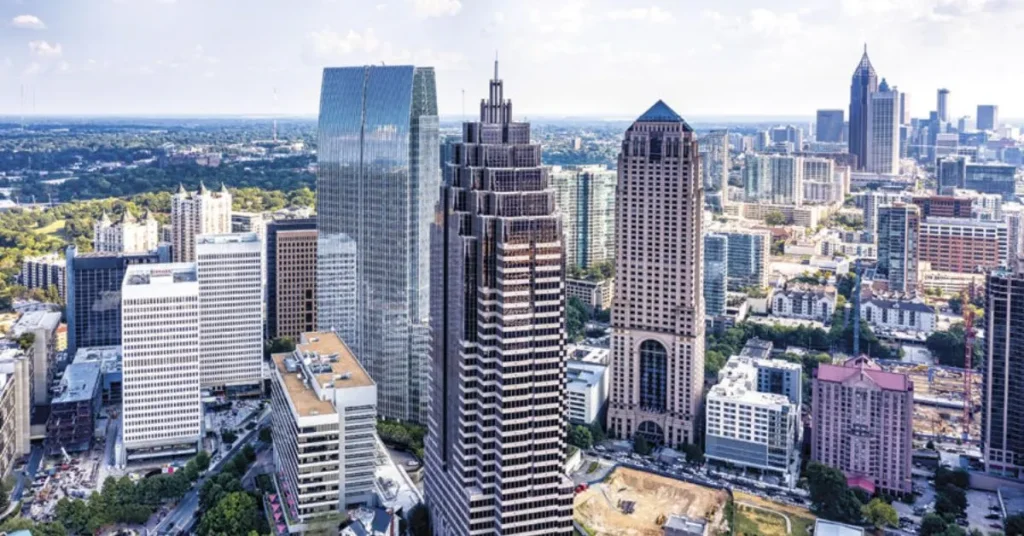The world’s economic center of gravity has slowly moved eastward over the past 20 years. However, this big trend is now facing new problems, such as supply lines being hampered by lockdowns and an energy crisis. But Georgia has a new chance amidst all this doubt.
This country in the South Caucasus is on the old Silk Road, which connects East and West. Over the past few years, it has been reviving its trading position by implementing major economic reforms that have cut down on red tape and made Georgia one of the easiest places in the world to do business.
You can do business here easily
Georgia’s business-friendly tax and labor laws make it easy to do business there. The World Bank says that its overall business tax and contribution rate is only 9.9% of profits, which is the third-lowest rate in the world.
Profits that are kept or invested do not have to be taxed. We don’t have a social security tax, and the tax on our income is a flat 20%.

Setting up a business can be done in as little as one day. The only place in the world that, according to the World Bank, has better business regulations than Georgia is New Zealand.
Georgia’s GDP grew by 10.4% in 2021, which led S&P to give the country a BB rating. The rating stated that growth could reach 4% to 5.5% each year “for 2022 and 2023.” A web of free trade agreements (FTAs) links the country to the EU, China (including Hong Kong, China), the UK, EFTA countries, the CIS, Turkey, and many more.
This puts the country in the middle of a market with 2.3 billion customers. It is in a good spot for business because it is an entrance to Central Asia and a way to get from Europe to the East.
The Baku-Tbilisi-Kars (BTK) rail project, which connects Turkey to the European rail network and the Caspian Sea, has made it clear that there are good investment opportunities in the logistics industry.
Central Asian countries that can’t get to Europe by land can trade minerals, machines, and transportation gear through Georgia. In December 2021, the first train bringing goods from Turkey to China ran on the new BTK railway.
The capital, Tbilisi, Kutaisi, the third-largest city in the country, and Poti, which is only two kilometers from the country’s biggest seaport, are all major cities in Georgia that have free industrial zones (FIZs).
Investors and companies in the industry sector can benefit from these zones because they have low taxes.
The government of Georgia is well-organized and business-friendly, and there isn’t a lot of red tape or complicated tax systems. Georgia also has easy access to talented people, which is good for business. Since 2005, more than 120,000 students have finished college or university in the country, and 55% of its working population is under 45 years old.
Georgia’s business process and IT sectors are becoming regional hubs for customer contact centers and building, design, and engineering services by taking advantage of its mostly young, literate, and well-educated workforce.
“There’s very little bureaucracy, very little red tape. That simplicity of doing business brings the trust for investors.”
— Alexander Mironenko, Country Director, Majorel Georgia
A big part of this success goes to companies like Majorel, which manages client experiences has offices in 36 countries and employs about 73,000 people. When it opened an office in Georgia, it thought it would have 300–400 employees. Now, six years later, there are ten times as many working there.
“Right now we have more than 3,000 workers.” Ninety percent are from Georgia, and 80% have college degrees or are looking to get them. Many of our most important areas are run by women. “We’re still growing,” says Alexander Mironenko, who is in charge of Majorel Georgia.
“Georgia is still a young country, but it has grown up a lot in the last ten or twenty years,” he says. “There isn’t a lot of red tape or paperwork.” That ease of doing business is what makes buyers trust you.
Utilizing the power of unfettered flow
Georgia gets 70% of its energy from hydropower. It has more than 20,000 rivers and almost 300 of them move quickly. Even though Georgia is surrounded by countries that need more renewable electricity, only 25% of its natural energy supplies are being used right now.
The country can help make up some of that gap by using the 1.45 GW of wind power that is thought to be available. With a capacity of 20.7 MW, the Qartli wind farm in the Caucasus Mountains is Georgia’s biggest wind project. There is also a lot of promise for solar power since some places get more than 2,000 hours of sunshine a year.
AIONRISE is an American company that makes solar photovoltaic (PV) panels. Since 2021, it has had a factory in Georgia with a 500 MW production capacity, which, according to Shokhrukh Baratov, AIONRISE’s Chief Business Development Officer, “makes it one of the largest in Europe.”
Read more: Aside from Trump and Vance, Who is the Weirdest Manga Character in 2024?
“Logistically, everything is in the perfect place.” Because we can get to the Black Sea, we can ship to any country, and the European Union and other big producers are close by.
AIONRISE’s success is helped by Georgia’s FTAs and following EU labor and code rules. This is because there is a growing need for solar setups in homes and businesses in the US and Europe.
“Everything is done the way it is done in Europe,” Baratov says. “That’s a great match for us, which is why we’re here.”
As AIONRISE’s solar business continues to grow, the company has started to talk to possible partners about raising money to get the raw materials it needs to make more PV cells in Georgia. “In the past 15 years, the price of solar has dropped almost five times,” says Baratov.
“From a financial point of view, there is no other option for people on Earth than to use the sun, which is the largest energy source in the world.”
“It’s easier to work here than in the US in terms of tax payments, bureaucracy, customs clearance, export and import operations—in almost everything.”
— Shokhrukh Baratov, Chief Business Development Officer, AIONRISE
Future investment
The European Bank for Reconstruction and Development (EBRD) has put €4.6 billion ($4.79 billion) into 270 projects all over Georgia because it likes how the country is reforming and spending money on infrastructure. President of the EBRD Odile Renaud-Basso recently praised Georgia’s efforts to deal with the COVID-19 problem. She also said that the bank’s investment in the country, which hit a record high of €618 million ($643 million) in 2020, was “focused on promoting a green economy, social equality, and digitalization.”
“Georgia has access to huge markets through its trade agreements.”
— Catarina Bjorlin Hansen, Regional Director for the Caucasus, EBRD
Catarina Bjorlin Hansen, EBRD’s Regional Director for the Caucasus, says that renewable energy projects in Georgia have a lot of room for both domestic and foreign funding. “We are also thinking about ways to make manufacturing and farming more environmentally friendly. We are also including eco-friendly features in the work we do with local banks.”
Georgia has worked hard to change its economy, boost its growth rate, and raise people’s living standards by adopting a wide range of reforms. Since 2000, energy use has almost doubled, mostly due to growth in transportation and industry. The EBRD says that Georgia’s electricity use is highly linked to its economic growth and “is not showing signs of decoupling.”
Georgia is opening up to more tourists and integrating with global markets through its free trade agreements (FTAs). In 2010, about 2 million foreign tourists came through. In 2019, that number rose to 9.4 million. From 2015 to 2019, tourism brought in $3.27 billion, up from $1.94 billion. This is 8.1% of the income.
“Because it is easy to get to, Georgia is a great place to invest.” You can talk to all the officials and people who make decisions. “You can get money; the banking system here is very well developed,” says Hansen. “But it’s important to see how your business would work here.” It’s very important to come and see it for yourself.



